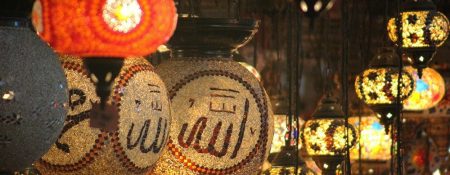
Umrah (from the Arabic “to visit a populated place” or “intention”) is a pilgrimage to Mecca. In contrast to Hajj Umrah can be accomplished at any time of the year. And most often, many Muslims choose Ramadan as the time for this. Especially the last ten days of the holy month. Another difference from Hajj is that Umrah is not obligatory. Sometimes such practice is called a lesser form of Hajj. It is believed that doing Umrah in the month of Ramadan is tantamount to Hajj. At the same time, Umrah cannot replace the obligatory Hajj.
Muslims can continue to fast during their journey to Mecca, or they can break the fast due to the fact that they are traveling and are on their way. In the latter case, the days of fasting should later be replenished.
The performance of Umrah at any time of the year, and especially in the holy month of Ramadan is considered a great virtue. It must be done with sincere intention and deep awareness. In such a case, these actions will receive a reward from Allah. For the one who commits Umrah, it is an opportunity to be cleansed, to get the sins written off and to get inspiration on the spiritual path.
O Allah, on this day, grant me compatibility with the good, keep me away from patching up with the evil, lead me in it, by Your mercy, to the permanent abode, by Your Godship, O the God of the worlds.




Ramadan, the holiest month in the Islamic calendar, is a time of spiritual reflection, self-discipline, and communal unity for Muslims around the world. In the United Arab Emirates (UAE), Ramadan holds significant cultural and religious importance, shaping the rhythm of daily life and fostering a unique atmosphere of warmth and spirituality.
The vibes of Ramadan in the UAE are palpable, as the entire country undergoes a transformative experience. From the breaking of dawn until the setting of the sun, the streets come alive with a sense of anticipation and reverence. The bustling cities slow down, and a serene ambiance takes over as families and communities come together to observe this sacred month.
One of the most cherished aspects of Ramadan is the spirit of giving and charity. Throughout the month, Muslims are encouraged to practice acts of kindness, generosity, and compassion towards those less fortunate. In the UAE, numerous charitable initiatives and community-driven efforts are organized to support those in need, reflecting the country's commitment to fostering solidarity and empathy.
The cultural importance of Ramadan in the UAE is deeply ingrained in the fabric of society. It is a time for strengthening familial bonds, reconnecting with loved ones, and honoring traditions passed down through generations. Families gather each evening for Iftar, the meal to break the fast, where a rich tapestry of traditional Emirati cuisine is shared and enjoyed in a spirit of unity and gratitude.
The UAE also embraces the diversity of its population during Ramadan, with residents from various cultural backgrounds coming together to partake in the festivities. Non-Muslims are welcomed to join in the spirit of Ramadan, participating in community events, and sharing in the sense of togetherness that defines this auspicious month.
Celebrations during Ramadan in the UAE extend beyond the confines of the home, with vibrant Ramadan tents set up in public spaces and hotels offering lavish Iftar buffets. These gatherings serve as focal points for socializing, where friends and colleagues come together to enjoy sumptuous meals and engage in lively conversations late into the night.
As the month draws to a close, the atmosphere becomes even more heightened with the arrival of Eid al-Fitr, the festival marking the end of Ramadan. Streets are adorned with festive decorations, and families gather to celebrate with feasts, gift-giving, and prayers of gratitude.
In essence, Ramadan in the UAE is a time of spiritual renewal, cultural celebration, and communal harmony. It serves as a poignant reminder of the values of compassion, tolerance, and unity that form the bedrock of Emirati society, making it a truly special and cherished time for all who call the UAE home.